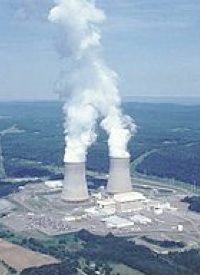
U.S. regulators on Thursday authorized plans to construct the nation’s first nuclear power plant in three decades, despite concerns stemming from Japan’s 2011 earthquake that led to a meltdown at the Fukushima nuclear plant last March. The Nuclear Regulatory Commission (NRC) voted 4-1 to grant Atlanta-based Southern Company a license to begin operating two new reactors at its existing Vogtle plant in Georgia, which will cost about $14 billion and are expected to enter service as early as 2016 and 2017.
The Georgia plant will introduce the first American versions of the “third-generation” reactors that have been emerging in China, and they are purported to be safer, with resilient and longer-lasting batteries and gravity-powered cooling systems that can operate longer during emergencies. The landmark vote is not a “nuclear renaissance,” but rather a “first wave” for new reactors, contended Scott Peterson, vice president of the Nuclear Energy Institute. “It’s obviously a critical event for the industry in terms of moving forward with the next generation of reactor technology.”
Licensing for U.S. nuclear power plants has been stunted since 1978, when there was a partial meltdown of a reactor at the Three Mile Island plant in Pennsylvania. Following the accident, the NRC enacted highly regulated safety standards, which spurred a calamitous rise in construction costs and blocked development of dozens of nuclear plants. Therefore, the 104 U.S. nuclear plants still under operation are modeled from construction dating to the 1960s and 1970s.
“The last plant that got to this stage of the [approval] process did so in 1978,” asserted Harold McFarlane, director of nuclear science and technology at the Idaho National Laboratory. “We think it’s a very significant step going forward. It is the first of the new generation.”
Following Japan’s 2011 earthquake — which was the catalyst to the Fukushima plant explosion — Germany, Spain, and Switzerland axed construction plans of any new nuclear power plants. China did just the opposite, surging forward with the new third-generation reactors.
McFarland asserted that the Vogtle plant’s newly approved AP1000 reactors, which are being manufactured by Westinghouse, have safety components that provide “days instead of hours” to restore electric power after a catastrophic event. This feature is critical for disastrous scenarios such as the Fukushima event, where the reactors endured a meltdown after the lack of electricity switched off their cooling systems.
In the upgraded models, “the water needed to cool the reactors is stored inside the containment building rather than outside of containment,” said Robert Buell, an analyst at Idaho National Laboratory. “You use physics and natural circulation along the containment walls to cool the reactors instead of relying on mechanical systems.”
NRC Chairman Gregory Jaczko cast the dissenting vote on the measure, citing the purported devastation of the Fukushima explosion. “I cannot support issuing this license as if Fukushima never happened,” charged Jaczko, who is intimately connected with congressional Democrats. “I believe it requires some type of binding commitment that the Fukushima enhancements that are currently projected and currently planned to be made would be made before the operation of the facility.”
Proponents of nuclear power alleged that Jaczko’s strong thumbs-down vote further solidifies the notion that the NRC is dysfunctional. “The chairman just voted against the first new nuclear reactors in 30 years,” Ed Batts, a partner at global law firm DLA Piper, emphasized. “That’s just not the way that confidence is inspired in the average American and thus does not seem like the best way for nuclear regulation.”
The majority of proposed nuclear reactors currently under consideration will be constructed at current plants, and so far the NRC is reviewing 12 licenses for reactors at 20 U.S. nuclear plants.
Thursday’s vote was a remarkable event for industry groups around the United States. “This is a historic day,” applauded Marvin Fertel, CEO of the Nuclear Energy Institute. The NRC vote, Fertel indicated, “sounds a clarion call to the world that the United States recognizes the importance of expanding nuclear energy as a key component of a low-carbon energy future that is central to job creation, diversity of electricity supply and energy security.”



